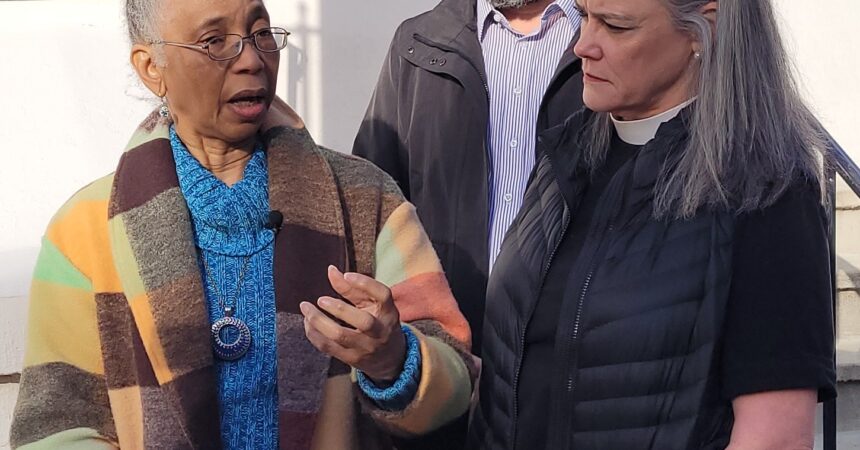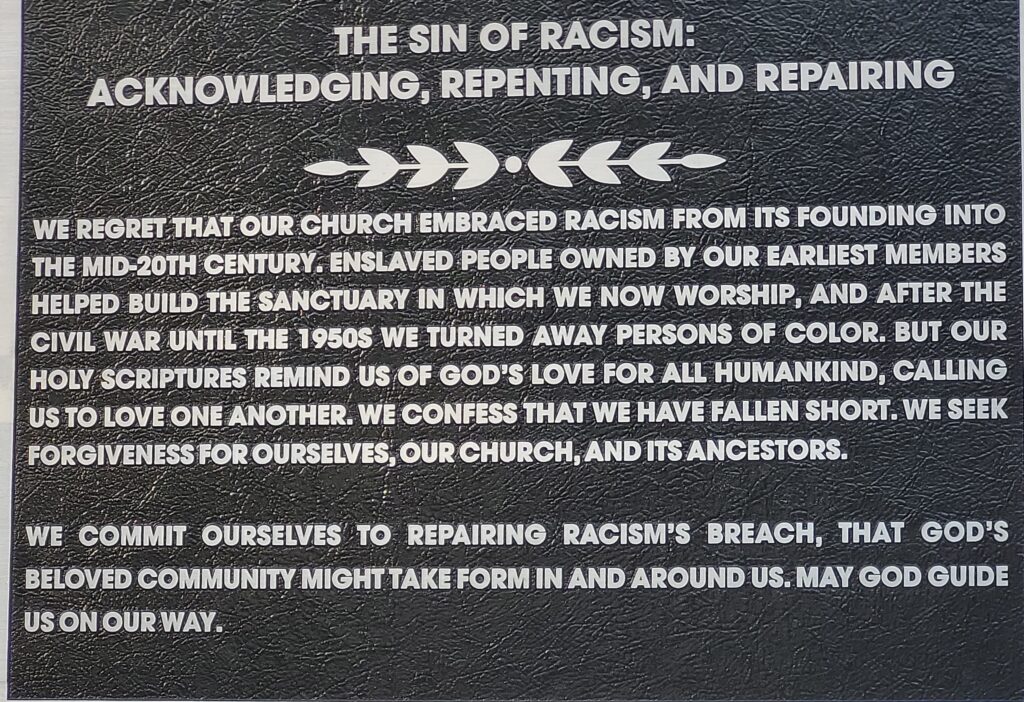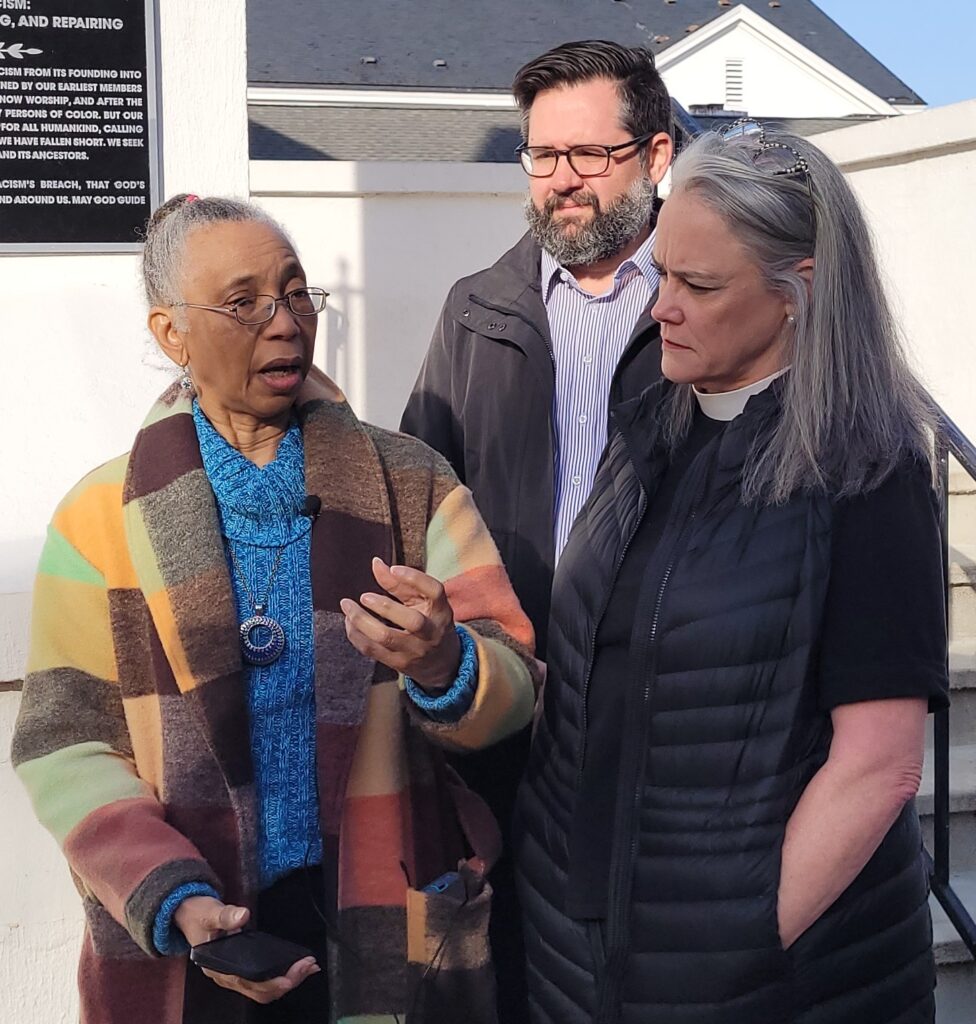
Denouncing racism
Downtown church makes public apology for its role in slavery

Photo by St. Clair Murraine

Photo by St. Clair Murraine
By St. Clair Murraine
Outlook Staff Writer
It was clear from the initial conversation between a group of First Presbyterian congregants that they wanted to find a way to publicly condemn their church’s role in slavery.
They decided a plaque that is now mounted on one of the pillars of the front portico of the church would be ideal. The six sentences on the black and white plaque are explicit.
The text amounts to an apology for the role that the Tallahassee church had in fostering slavery.
The church has since collaborated with the Black History Alliance to bring awareness to the plaque and its cause. The local church going public is the latest in a national effort by Presbyterian Church USA to try to heal the damage done by slavery.
In 2022, the national headquarters announced that Rev. Anthony Jermaine Ross-Allam will head up a new initiative, the Center for the Repair of Historical Harms. Ross-Allam is expected to be the keynote speaker on Feb. 29 at a luncheon scheduled take place at the church, beginning at noon.
In part, the inscription on the plaque reads: “We regret that our church embraced racism from its founding into the mid-29th century. Enslaved people owned by our earliest members helped build the sanctuary in which we now worship.”
The Black History Alliance’s creative director and founder Priscilla Hawks joined Rev. Anne Apple, interim minister at First Presbyterian Church for a press conference last Thursday. Nick Quinton, a civil rights advocate, was also there to outline their plans for engaging the public during Black History Month.
The group is encouraging the public to stop by the church at 110 North Adams Street to take a selfie photo with the plaque and upload it to either the church’s or the Black History Alliance’s website. The photos will be used in an exhibit that will be set up at the Feb. 29 luncheon. Prior to that, on Feb. 14, an Ash Wednesday celebration is planned for 6 p.m. at First Presbyterian.
Throughout Black History Month and beyond, emphasis will be on the Presbyterian Church’s apology for its role in slavery.
“It is just a sign,” Apple said. “Yes. But we want to hear does this matter and how does it matter.”
For years leading up to the Civil War, slavery was rampant in Tallahassee, according to author Bertram Groene, who wrote Ante-bellum Tallahassee. He estimated that at least 2,197 slaves resided in Leon County, outnumbering Whites by more than 1,000.
The stance that the Presbyterian Church has taken is a courageous one, Hawkins said.
“It’s a monument to what this church believes in, which is equity and a show of compassion,” she said. “It is an apology for the role that this church had in slavery in Tallahassee. … They realize they were wrong.”
Quinton, who spent several years advocating during the civil rights movement, said the apology brings him “deep joy.”
Any doubt about slavery in Tallahassee could be found through legal filings, tax rolls, newsletters and bulletins, Quinton said.
“Sometimes rooting through these details (and) these documents will be difficult for some of us, but it’s necessary work,” he said. “In the end, together, that’s where we find the joy in the healing.”
Apple was just as optimistic that the revelations on the plaque give the church an opportunity to turn a page that stood in time for decades.
“The church is in a new place,” she said. “A new beginning. I believe it is a place of hope.”
Acknowledging racism
“We regret that our church embraced racism from its founding into the mid-29th century. Enslaved people owned by our earliest members helped build the sanctuary in which we now worship. And after the Civil War until the 1950s we turned away persons of color. But our holy scriptures remind of God’s love for all humankind, calling us to love one another. We confess that we have fallen short. We seek forgiveness for ourselves, our church and its ancestors. We commit ourselves to repairing racism’s breach, that God’s beloved community might take form in and around us. May God guide us on our journey.”







